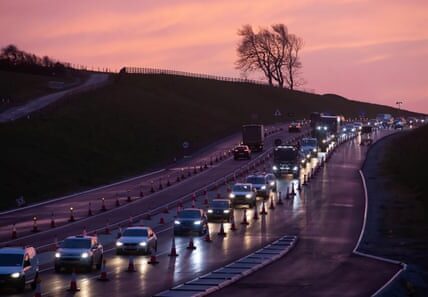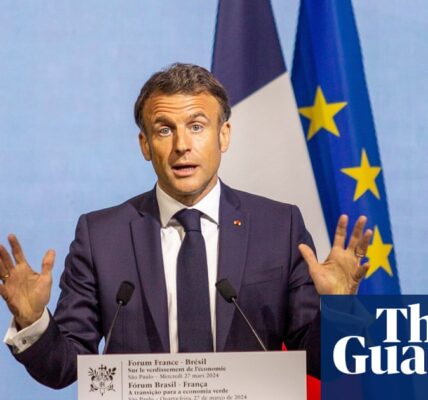Sunak was accused of backing away from his role as a global climate leader at the 28th Conference of Parties (Cop28).
Rishi Sunak has faced criticism for his perceived lack of global leadership, with some accusing him of scaling back and withdrawing. During the Cop28 summit, he asserted that the expenses associated with achieving net zero have caused climate politics to reach a critical juncture.
Although several global leaders, such as King Charles, emphasized the need for immediate action on climate change, the prime minister used his short time at the Dubai summit to advocate for his strategy of gradually implementing net zero policies and easing financial burdens on families.
During the summit, Sunak stated that none of the world leaders had questioned him about the postponement of the ban on petrol cars, following his shift to a more practical approach towards achieving net zero targets a few months back. He emphasized that Britain is at the forefront of tackling climate change and urged other nations to take more action. He also mentioned that other countries have expressed their appreciation for the efforts made by the UK thus far.
The tone used by Sunak during the summit received negative feedback from charities, who claimed that he did not understand the situation, and some Conservative politicians expressed concern that he was jeopardizing the UK’s role as a leader on the matter. Keir Starmer, the leader of the Labour party, commented that Sunak’s statements demonstrated how his narrow-mindedness was impacting his ability to demonstrate a strong commitment and take charge on climate issues.
The prime minister’s communication was noticeably different from that of Charles, who delivered the main speech. Charles acknowledged that this year has been the hottest on record and expressed concern that the efforts to address the issue were not moving fast enough. He urged the summit to reflect on the gravity of the situation, stating, “Records are constantly being broken, and we may be desensitized to their significance. We must take a moment to truly understand what this means: our actions are pushing the natural world beyond its limits, into uncertain and perilous territory.”
Sunak faced additional humiliation as the king donned a tie featuring the Greek flag for their meeting, which occurred at the end of a week where the prime minister had cancelled a scheduled meeting with his Greek counterpart due to the latter’s request for the return of the Parthenon marbles. No 10 declined to provide a statement, stating that it was under the jurisdiction of the palace. However, Greek media perceived the king’s choice of tie as implicit support for Athens’ stance.
Sunak only spent eight hours in Dubai and appeared annoyed by inquiries regarding his dedication to climate objectives. This is despite the fact that he has lowered the UK’s targets, redefined climate assistance to align with his goal of spending £11.6 billion over five years, and made a commitment to continue oil and gas exploration in the North Sea.

According to him, the expense of achieving net zero emissions could jeopardize the public’s backing for addressing the climate emergency. He insisted that his practical approach to the matter was not radical or divergent from other nations.
In his address to global leaders, he emphasized the UK’s full dedication to achieving net zero emissions. However, during a press conference, he encouraged other countries to set higher goals while also stating that the UK is already taking more action than any other nation. He mentioned the postponed ban on petrol and diesel vehicles, stating that not a single leader he spoke to had addressed the issue because their targets are not as ambitious as the UK’s.
He stated that the target year of 2035 for eliminating petrol and diesel cars aligns with the timelines of other industrialized nations. He believes this highlights the skewed nature of the current discussions, stating, “Merely adjusting a deadline to match those of other countries is being portrayed as a radical step.”
Starmer criticized Sunak for lacking leadership at Cop28 and accused him of shrinking and retreating. He stated that the prime minister’s tendency to downplay the issue shows the small-mindedness of his politics, citing instances such as his comments about the Greek prime minister and labeling environmental activists as “eco-zealots.” Starmer emphasized that this is not a matter to be ignored or avoided.

Chris Skidmore, the Conservative former energy minister and adviser on net zero, told the Guardian it was “true the UK is a climate leader”, as it had led the G20 in halving emissions since 1990, been the first G7 country to commit to net zero and had the most ambitious nationally determined contribution of any nation.
Skip over the advertisement for the newsletter.
after newsletter promotion
He continued by saying, “However, this does not imply that we should remain stagnant. As evidenced by my mission zero review, achieving net zero is a major economic opportunity in the next decade, bringing in investments, promoting regional development, creating new jobs, and increasing exports. This has the potential to generate around £1tn by 2030. If we are not willing to take the lead, another country will and reap the economic benefits of leading the energy transition.”
The US and EU are both pursuing measures to reduce inflation and promote environmental sustainability through the Inflation Reduction Act and the green deal, respectively. Staying idle puts us at risk of falling behind, as there are no rewards for being second and a green economy is essential for our future economic success.
The former environment minister Zac Goldsmith, who resigned while accusing Sunak of being “uninterested” in green issues, was more critical, telling Sky News: “There’s no doubt our standing has diminished considerably in recent months. The UK is just not seen by our allies – big and also small island members of the Commonwealth – as a reliable or serious partner.”
Charitable organizations and advocates for the environment were not impressed by Sunak’s assertion that he is a global leader in addressing climate change. According to Rebecca Newsom from Greenpeace UK, this is a recycled statement that has been heard too many times before. She criticized Sunak for pretending to be a main act while actually repeating a disappointing collection of policies that undermine the goal of achieving net-zero emissions. She also called out his lack of addressing the most important issue at the conference: a worldwide transition away from fossil fuels.
“Compared with the hundreds of billions needed to support the poorest countries, the £1.6bn announced today barely touches the sides, and it’s clear that only around half of it is new money.”
According to Tessa Khan, the executive director of Uplift, a group advocating for a UK without fossil fuels, the prime minister misinterpreted the situation completely.
She stated that although the leader of the UN is urging countries to quickly eliminate their use of fossil fuels, the UK is among a small group of affluent nations that are still approving the development of large new oilfields. The lack of concern from Rishi Sunak in addressing the climate crisis may not sit well with voters in the UK, but to pretend ignorance at the Cop and overlook the UK’s contribution to worsening the situation, such as the approval of the vast Rosebank oilfield, is a source of diplomatic embarrassment.
Source: theguardian.com

